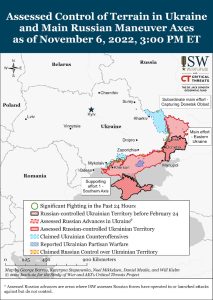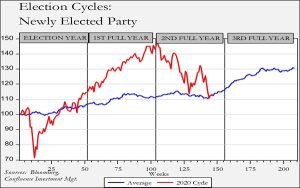Daily Comment (November 7, 2022)
by Patrick Fearon-Hernandez, CFA, and Thomas Wash
[Posted: 9:30 AM EDT] | PDF
Our Comment today opens with an update on the Russia-Ukraine war. We next review a wide range of other international and U.S. developments with the potential to affect the financial markets today, including multiple reports related to China. Importantly, there are conflicting reports about China’s readiness to ease its Zero-COVID policies, which have done so much to impede Chinese and global economic activity.
Russia-Ukraine: As Ukrainian forces continue to press their counteroffensives in the northeastern Donbas region and in the southern region around Kherson, Russian forces continue to strike back with air, missile, and kamikaze drone attacks against civilian infrastructure across Ukraine. The Russians are also attempting to counterattack with ground forces, but reports indicate a contingent of their Pacific Fleet Marines took heavy casualties in the Donbas recently. At the same time, Russian financier Yevgeny Prigozhin continues to throw his Wagner Group mercenaries against the Ukrainian city of Bakhmut in the Donbas region and is reportedly close to taking the city, albeit with significant casualties. However, most Western observers that we follow believe that the capture of Bakhmut would give Russia little strategic advantage; rather, the Wagner Group attacks there appear to be designed to bolster Prigozhin’s leadership credentials, perhaps for his take over as Russian defense minister or for him to eventually seize power from President Putin.

- A report in the Wall Street Journal stated that U.S. National Security Advisor Sullivan, in recent months, has engaged in confidential discussions with high-level Russian officials to reduce the risk of a broader conflict over Ukraine and to warn Moscow against using nuclear or other weapons of mass destruction.
- Some Western analysts dismiss the possibility out-of-hand that Russia might take steps toward using a tactical nuclear weapon in its war with Ukraine, but as President Putin becomes increasingly backed into a corner, we would place the probability of such a move at around 25% or so.
- Sullivan’s discussions with the Russian leadership confirm that the risk of such an event is not negligible.
- In any case, Sullivan’s instinct to keep the lines of communication open reflects how many national security personnel in the U.S. administration are traditionalists and well-schooled in the imperatives of U.S.-Russian diplomacy and great-power rivalry.
United States-China: Just one month after the U.S. imposed a series of tough, new restrictions on sending advanced semiconductor technology, goods, or services to China, reports show Chinese tech firms such as Alibaba (BABA, $69.81) have found at least one workaround as the firms are tweaking their most advanced chip designs to reduce processing speeds, allowing them to avoid U.S. sanctions when the chips are shipped back to China after being made in Taiwan.
- With the U.S.-China geopolitical rivalry intensifying, the U.S. restrictions aim to suppress China’s computing power and make it more difficult for the country to compete economically and militarily.
- China’s indigenous semiconductor plants are most likely decades away from producing cutting-edge chips such as those designed by Alibaba, so the move to deliberately cut their processing speeds is likely to have a noticeable impact on Chinese firms.
China-Solomon Islands-Australia: Illustrating how some countries will likely try to play the evolving China-led geopolitical bloc against the U.S.-led bloc for their own advantage, last week the Solomon Islands took delivery of a Chinese domestic security aid package consisting of two water cannon trucks, 30 motorcycles, and 20 SUVs for its police force, just days after it took delivery from Australia of 60 short-barreled police rifles and 13 vehicles.
- In our recent study projecting which countries will end up in each of the evolving geopolitical blocs, we assigned the Solomon Islands to the “Neutral” camp. Our study projects that Australia will be a key member of the U.S.-led bloc.
- The competing Chinese and Australian donations come one year after the Solomons’ Prime Minister Sogavare put down a violent uprising stemming from his efforts to switch the country’s allegiance to China as he attempts to retain power.
- In the coming years, as the U.S. and Chinese blocs attempt to curry favor with other ostensibly neutral countries, such as Indonesia and Vietnam, we suspect many of the neutrals will try to play the two blocs off each other in order to take advantage of the situation and retain their room to maneuver.
Chinese COVID Policy: In a Saturday press conference, government health officials said they will continue to enforce President Xi’s “dynamic Zero-COVID” policy, calling it “completely correct, most economical, and effective.” Although the officials promised to continually refine the policy to minimize economic and social disruptions, the statement suggested that the Chinese economy and financial markets will continue to struggle with the economically painful policy. However, reports based on insider accounts this morning indicate high-level officials are actually reconsidering the Zero-COVID policy but want to move slowly before abandoning it to limit any downside for public health and/or for the political position of the Communist Party. The conflicting reports have whipsawed stock equity futures over the last day.
- The headwind from the Zero-COVID policy has added to China’s many other problems, such as the government’s crackdown on whole swaths of the private sector, foreign clampdowns on technology and capital flows into China, and weakening foreign demand for Chinese exports. Indeed, data this morning showed that Chinese exports in October were down 0.3% year-over-year, marking their first annual decline since May 2020.
- The Zero-COVID policy and new outbreaks of the disease have also presented challenges for U.S. firms currently active in China. Yesterday, Apple (AAPL, $138.38) said global shipments of its newest high-end iPhones will be delayed after the latest lockdowns caused havoc at a factory run by a main supplier, Hon Hai Precision Technology (HNHPF, $6.22).
Chinese Finance Sector: The Communist Party announced that Fan Yifei, one of the six deputy governors of the People’s Bank of China, has been detained as part of an investigation into “suspected serious violations of discipline and law.” Fan, a former high-level officer at China Construction Bank (CICHY, $10.98), is the latest in a series of financial officials who have been arrested on corruption charges over the past two years.
- Foreign investors are now quite attuned to President Xi’s value-destroying crackdowns on sectors such as technology and real estate development.
- Fan’s arrest is a reminder that China’s broader financial sector is also at risk of a regulatory crackdown. At the PBOC, Fan’s responsibilities included overseeing the country’s payment system and shepherding the central bank’s effort to create a digital currency. His arrest signals that those two areas may now be a focus of the party’s corruption police.
United Kingdom: When he releases his Autumn Statement at mid-month, Chancellor Hunt reportedly will call for tax increases and public spending cuts worth up to £54 billion per year to close the government’s yawning fiscal deficit. Not only would the fiscal tightening reverse Former Prime Minister Truss’s plans, which sparked a massive selloff in U.K. government bonds, but it would also mark a return to growth-inhibiting austerity like that of the early 2010s.
U.S. Economy: New polling suggests that almost three-quarters of U.S. consumers plan to seek less-expensive alternatives in this year’s holiday shopping season, driven largely by high inflation and concerns about an economic downturn. The report is a reminder that the resilient labor market and continued high employment will not necessarily preclude a drop in consumer spending or a broader economic recession. We continue to believe a recession is likely to begin in the next few quarters.
U.S. Elections: Voters across the country will go to the polls tomorrow for mid-term elections in which all seats in the House of Representatives and one-third of the seats in the Senate will be contested. The latest polling suggests that the summer swing of voting intentions toward the Democrats has now largely dissipated, raising the chance that the Republicans could take control of both chambers.
- For investors, perhaps the key thing to remember is that U.S. stock prices typically rebound once the mid-term elections are finished, perhaps reflecting greater clarity on which party will control policy.
- If that happens again this year, it would suggest stocks could rebound in the coming months and beyond. The chart below shows stock performance this cycle versus the average when a new party takes over the presidency (as happened in 2020).



